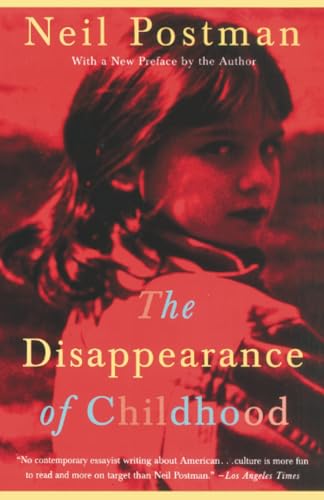The Disappearance of Childhood
Neil Postman
BOOK REVIEW

As vibrant waves of the digital age crash around us, reshaping the very essence of existence as we know it. In this maelstrom of information and pixelated realities, Neil Postman's The Disappearance of Childhood emerges as a clarion call-a stark warning about the perilous state of innocence in our era. 🌊
First published in 1994, Postman's magnum opus dives deep into the cultural transformations that have ensued with the rapid rise of mass media. It interrogates the crumbling boundaries of childhood, a sacred haven once shielded by ignorance and playfulness. His central thesis is poignant: the interface of technology-specifically television-has seized the essence of childhood, morphing it into a public spectacle that robs children of their exclusive cocoon of innocence. The playful naivety we once celebrated has been siphoned off into a world where children are conversing with adults about issues that would make a seasoned politician flinch. 👶⚖️
Postman's insight is not merely an observation; it's a wake-up call. He asserts that childhood is a social construct that arose only in response to certain circumstances, primarily shaped by the advent of literacy. As society evolved, this concept flourished-children were shielded from the complexities of adult life, nurtured in protected spheres of imagination. But with the intrusion of television, there emerged a radical shift. Childhood, once characterized by adventure and exploration, is now muddled with adult themes, losing its sanctity. 📺🔍
What drives this dissolution? It's not merely technology but the cultural narrative woven around it. Postman contends that we are living in an information overload, leading society to expect children to "know" before they actually can comprehend. The digital landscape demands engagement at astonishing speeds, dismantling those boundaries that once encouraged thoughtful development. Today's children, bombarded by relentless streams of information, are expected to keep pace, losing the art of reflection and the joy of exploration. 🕵?♂️🌐
To understand the impact of this phenomenon, one must consider the reactions from readers who have journeyed through Postman's dissection of society. Many express a blend of admiration and dismay, recognizing the veracity of Postman's warnings while grappling with the unsettling truth laid before them. Some praise his clarity and foresight, picking up on the alarming trajectory of our cultural evolution, while others dismiss his predictions as overly pessimistic. Yet, the common thread in all opinions reveals a growing anxiety-a fear of what the future holds for our children as the boundaries continue to erode.
Beyond the critiques, the dialogue surrounding The Disappearance of Childhood has ignited critical contemplation in various spheres-education, parenting, and developmental psychology. Renowned educators have cited Postman as a pivotal influence, using his ideas to advocate for redefined approaches to childhood education. They argue for environments that prioritize experiential learning and emotional intelligence, countering the decline of innocence with nurturing spaces that encourage genuine wonderment. 🏫❤️
As we navigate this complex landscape, it becomes essential to distill Postman's teachings into actionable insights. Could we, as caregivers and educators, strive to create sanctuaries that value conversations over screens? Could we reclaim the art of storytelling, prioritizing the nurturance of imagination without the encroachment of adult realities? In a world fraught with technological entanglements, these inquiries are not just relevant; they are crucial. ✨️📖
Ultimately, what The Disappearance of Childhood offers is not merely a critique but a pathway towards rediscovering the essence of childhood in an increasingly chaotic world. It is a manifesto for reclaiming innocence, a guide not just for educators but for anyone who cherishes the magic of youth.
By melding the past with the present, Neil Postman reminds us that childhood needs protection, that innocence must be preserved against the tides of information, and that the future demands our deepest commitment to nurturing those who will shape it. 🌟
Let us not stand by as mere spectators while our children are thrust into the limelight of adulthood. Instead, let us act, ensuring that the beauty of childhood remains a cherished sanctuary, a vital part of our humanity. Your children, your future, deserve nothing less.
📖 The Disappearance of Childhood
✍ by Neil Postman
🧾 177 pages
1994
#disappearance #childhood #neil #postman #NeilPostman